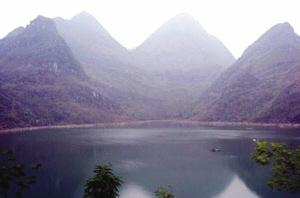HONG KONG—Eight years ago, at the location where a big mountain once stood, a lake was suddenly formed with more than 60 feet of water depth. The event occurred in Laibin City, Guangxi Province. Eight years after the lake’s first appearance and within seven days of a thunderous blast heard throughout the lake area, the lake disappeared. Geologists suggest that the observed changes might have been caused by movements within the earth’s crust.
The Hong Kong Sun reported that local villagers had named the newly formed lake “Dun Lake.” In Zhuang ethnic language (used by the Zhuang people, most of them live in the Guangxi Zhuang Autonomous Region), the word “dun” means a “mountain submerged under water.” Dun Lake was located in Suiyi Town, Yicheng County of Laibin. Villagers said that a great mountain had once stood there but was later occupied by the lake. During the summer of 1999, the mountain had changed into a lake after heavy rains had swept through the area. The newly formed lake had a surface area of 66 acres.
Dun Lake supported schools of fish and shrimp. Villagers had recently started to fish the lake. Some of the fish caught in the lake weighed close to 30 pounds. Many villagers from areas surrounding the lake were now making their living as both fishermen and farmers. The presence of the 66-acre lake also meant that farmers had a water supply which could be regulated to supplement rain in times of drought.
A thunderous blast was heard coming from the direction of Dun Lake on the evening of March 9, 2007. At daybreak on March 10, local residents discovered that water levels in the lake were dropping quickly, and there were several huge vortexes producing humming sound. By March 16, Dun Lake had disappeared.
News about the rapidly emptying lake spread quickly throughout the area. Villagers reported large catches of fish and shrimp as Dun Lake’s water levels dropped. However, they felt saddened when the lake had completely disappeared. Local officials said that plans for tourism and agriculture around Dun Lake would have to be postponed.
Lan Gande, director of the Water Resources of Yicheng County and retired engineer Zhou Zuzhi tried to explain the sudden changes at Dun Lake. They said that Yicheng County was located within a rocky area of Karst topography. Lan and Zhou suggested that an underground river that had formed in the soluble layers of bedrock beneath the area now known as Dun Lake may have become blocked by collapsing rocks and/or sludge. When the channels of the underground river were blocked eight years ago, the underground water flowed through cavernous porosity or some crevices in the rocks and backed up, resulting in the appearance of a lake at the surface. When geological changes on March 9 caused the underground channels to open, water quickly drained out and flowed through the channels, thus the lake disappeared.



